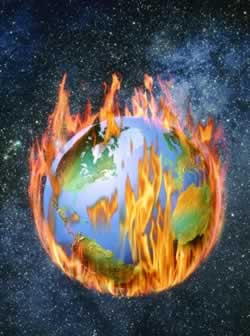Friday, July 28, 2006
Utilities Ante Up Again For A Global Warming Debunker

Providing a public face for the denial of scientific evidence of global warming -- enabling cover for the bespoiling of the planet for corporate purposes -- wouldn't be many peoples' idea of right livelihood.
But someone can always be found to do it for the money:
Coal-burning utilities are passing the hat for one of the few scientists skeptical that human activity is causing harmful global warming.
Patrick J. Michaels -- Virginia's state climatologist, a University of Virginia professor and senior fellow at the libertarian Cato Institute -- told business leaders in the West last year that he was running out of money for work. So last week, a Colorado utility launched a campaign to help him, raising at least $150,000 in donations and pledges.
The Intermountain Rural Electric Association of Sedalia, Colo., gave Michaels $100,000 and started the fundraising drive, said General Manager Stanley Lewandowski. He said one company plans to give $50,000 and a third plans to give Michaels money next year.
"We cannot allow the discussion to be monopolized by the alarmists," Lewandowski wrote in a July 17 letter to 50 other utilities. He also called for a counterattack on "alarmist" scientists and former vice president Al Gore's movie about global warming, "An Inconvenient Truth."
Michaels and Lewandowski are open about the money and see no problem. Some top scientists and environmental advocates call it a clear conflict of interest. Others view it as the type of lobbying common on many divisive issues.
Others view the global warming debunkers as being more dangerous than holocaust debunkers.
Both odious types use sophistry to push plainly untenable points of view. The global warming "skeptics", however are participating in an effort that will have disastrous long range consequences upon the future of mankind.
James Hanson -- one of the U.S. government's top climate experts -- in an extensive article debunks the debunkers, and lays out the real scientific situation for those who may still mistakenly believe that there is some scientific debate about whether global warming exists.
Hanson specifically addresses the propagandizing of the American people by those who put short term profits over the welfare of their children and grandchildren:
Why are the same scientists and political forces that succeeded in controlling the threat to the ozone layer now failing miserably to deal with the global warming crisis? Though we depend on fossil fuels far more than we ever did on CFCs, there is plenty of blame to go around. Scientists present the facts about climate change clinically, failing to stress that business-as-usual will transform the planet. The press and television, despite an overwhelming scientific consensus concerning global warming, give equal time to fringe "contrarians" supported by the fossil fuel industry. Special interest groups mount effective disinformation campaigns to sow doubt about the reality of global warming. The government appears to be strongly influenced by special interests, or otherwise confused and distracted, and it has failed to provide leadership. The public is understandably confused or uninterested.
I used to spread the blame uniformly until, when I was about to appear on public television, the producer informed me that the program "must" also include a "contrarian" who would take issue with claims of global warming. Presenting such a view, he told me, was a common practice in commercial television as well as radio and newspapers. Supporters of public TV or advertisers, with their own special interests, require "balance" as a price for their continued financial support. Gore's book reveals that while more than half of the recent newspaper articles on climate change have given equal weight to such contrarian views, virtually none of the scientific articles in peer-reviewed journals have questioned the consensus that emissions from human activities cause global warming. As a result, even when the scientific evidence is clear, technical nit-picking by contrarians leaves the public with the false impression that there is still great scientific uncertainty about the reality and causes of climate change.


